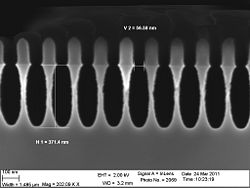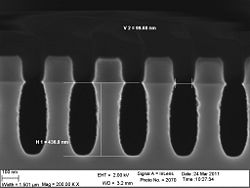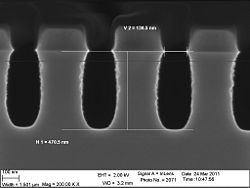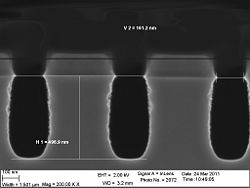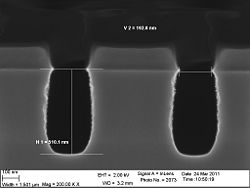Specific Process Knowledge/Etch/DRIE-Pegasus/nanoetch/nano11: Difference between revisions
Appearance
No edit summary |
No edit summary |
||
| Line 2: | Line 2: | ||
<!--Checked for updates on 30/7-2018 - ok/jmli --> | <!--Checked for updates on 30/7-2018 - ok/jmli --> | ||
<!--Checked for updates on 5/10-2020 - ok/jmli --> | <!--Checked for updates on 5/10-2020 - ok/jmli --> | ||
<!--Checked for updates on 28/6-2023 - ok/jmli --> | |||
{{contentbydryetch}} | |||
== The nano1.1 recipe == | == The nano1.1 recipe == | ||
Revision as of 11:32, 28 June 2023
Feedback to this page: click here
Unless otherwise stated, the content of this page was created by the dry etch group at DTU Nanolab
The nano1.1 recipe
| Recipe | Gas | C4F8 38 sccm, SF6 52 sccm |
|---|---|---|
| Pressure | 4 mTorr, Strike 3 secs @ 15 mTorr | |
| Power | 600 W CP, 50 W PP | |
| Temperature | 10 degs | |
| Hardware | 100 mm Spacers | |
| Time | 120 secs | |
| Conditions | Run ID | 1815 |
| Conditioning | Sequence: Oxygen clean, MU tests, processes, no oxygen between runs | |
| Mask | 1dfhj10 nm zep etched down to 6dgh4 nm |
- The results of the nano1.1 recipe
-
The 30 nm trenches
-
The 60 nm trenches
-
The 90 nm trenches
-
The 120 nm trenches
-
The 150 nm trenches
| Nominal trench line width | ' | 30 | 60 | 90 | 120 | 150 | Avg | Std |
| Etch rates | nm/min | 183 | 218 | 232 | 249 | 256 | 228 | 29 |
| Sidewall angle | degs | 95 | 94 | 94 | 93 | 93 | 94 | 1 |
| Cd loss | nm/edge | -2 | -4 | -16 | -15 | -27 | -13 | 10 |
| CD loss foot | nm/edge | -2 | -4 | -16 | -15 | 3 | -7 | 9 |
| Bowing | 36 | 40 | 49 | 48 | 40 | 42 | 6 | |
| Curvature | -55 | -50 | -39 | -39 | -42 | -45 | 7 | |
| zep | nm/min | 172 | ||||||
Comments
The lower coil power run may still be isotropic-looking either because of a lack of deposition in the process, or because the bias increases as the coil power is decreased, hence the wafer would have received a more phyisically-aggressive process. Lower temp, lower coil + lower platen may be worth a look.

